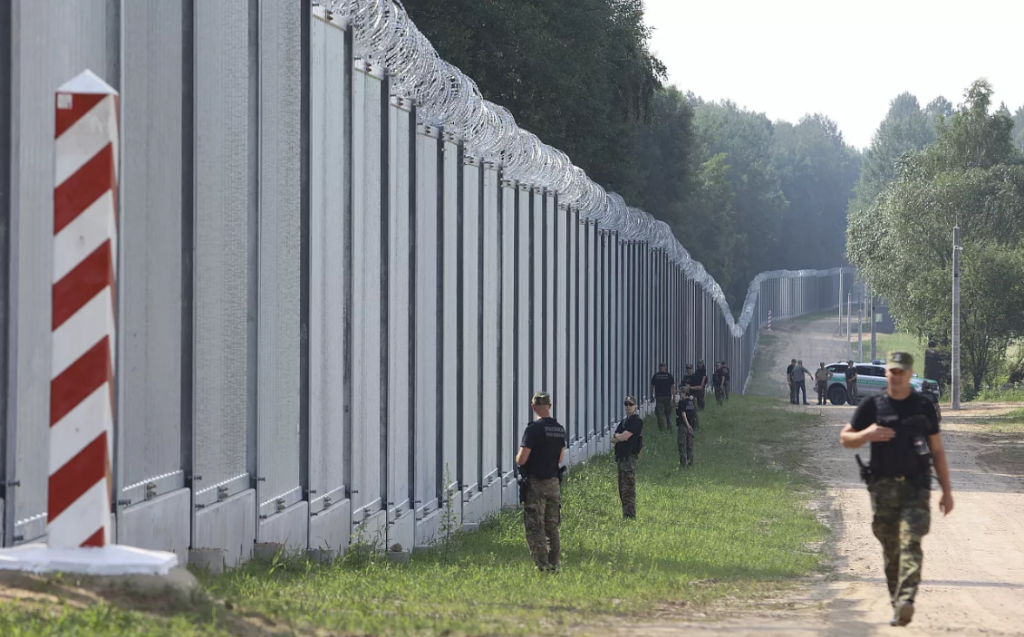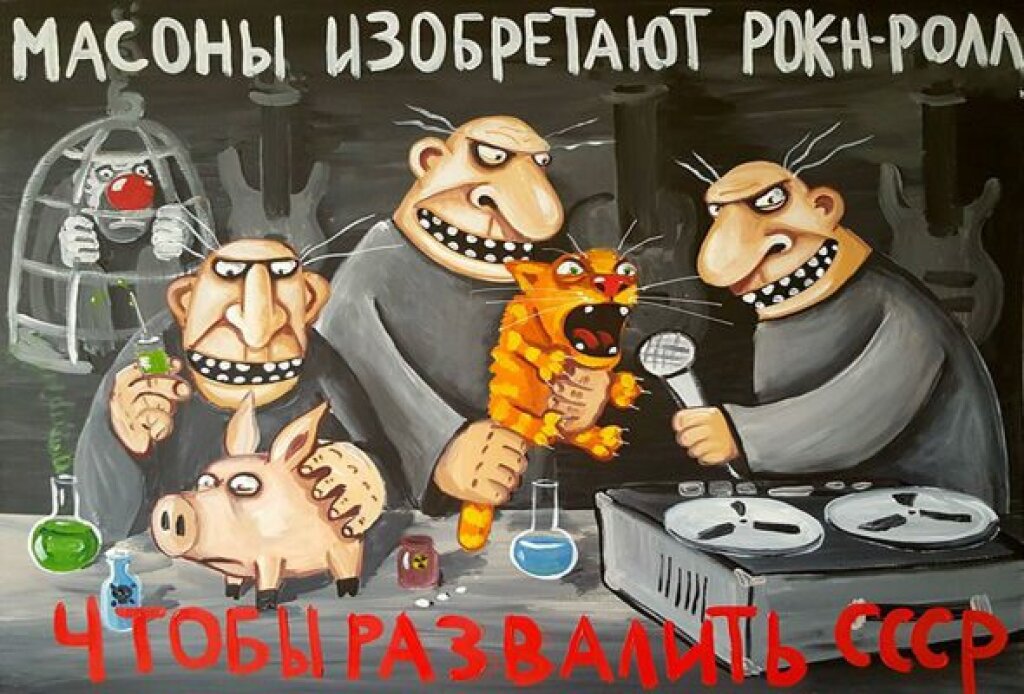The Jordan Center stands with all the people of Ukraine, Russia, and the rest of the world who oppose the Russian invasion of Ukraine. See our statement here.
A version of this essay originally appeared on Lefteast on 4/13.
Daria Krivonos is a sociologist and postdoctoral researcher at the University of Helsinki. Her work explores migration at the intersection of racialization, labor, class and gender. Her current project examines young Ukrainian migrant labour and precarity in the context of the Polish service economy. She tweets as @KrivonosDaria.
Above: A segment of Poland's 186-km metal border wall with Belarus. Source
In recent years, there has been a growing tendency among scholars and activists in Eastern Europe to draw parallels and links between the “postcolonial” and the “postsocialist.” At the limit, as Adem Ferizaj argues in his recent review of Piro Rexhepi’s White Enclosures: Racial Capitalism and Coloniality along the Balkan Route (Duke University Press, 2022), the use of post-colonial approaches in the context of post-socialism “leads to the false analogy" that "post-socialism is more or less the post-colonialism of all populations affected by the fall of the Berlin Wall.”
Russia’s unprovoked invasion into Ukraine has given this discussion a new push. The framing of Ukraine and other Eastern European countries as former Soviet or Russian colonies sometimes led to some expectations that countries in the “Global South” would find common cause with Ukraine and the experience of Soviet or Russian imperialism in Central Eastern Europe more broadly. By this logic, histories of colonialism and oppression should drive solidarities across Ukraine, Europe’s East, and the “Global South.” Yet the move to build solidarities and seek connections between post-socialism and post-colonialism, Europe’s East and the “Global South,” has been unidirectional and has predominantly, if not exclusively, come from those located in Eastern Europe. This fact should prompt us to examine how, exactly, the history of Russian imperialism pertains to the non-European South.
Russia’s invasion of Ukraine should certainly be understood as both nationalist and imperialist, and Russia’s white majority should rethink Russian history through the prism of imperialism. Scholars of the region are already discussing the applicability of the “colonial” to the Russian Empire, Soviet Union, and Russian Federation. A related question is about the relationship of Russian imperialism to global anti-colonial struggles: on what grounds can, or should, Eastern European countries seek solidarity with other formerly colonized parts of the world? In this essay, I suggest that analogies between post-colonialism and post-socialism should not be drawn too hastily; doing so requires, at the very least, examining the region’s active participation in policing Europe's physical and symbolic borders.
“Return to Europe” and the policing of EU borders
One narrative of the post-1989 era presented by Western and East European elites was the story of a “return to Europe.” This "return" was said to be a liberation from Soviet occupation or colonialism, from “orientalist Bolshevism,” and a return to “European civilization” and a “common European home." Emphasizing the innate "European-ness" of former Soviet bloc states has been a priority for many regional identity discourses.
Notions of Europe and European-ness became central again after the start of the 2022 war in Ukraine. Western observers cast Ukrainians not only as defending their right to exist as a nation, but as fighting “for European values,” a commitment that, in theory, should strengthen international support for Ukraine. This framing suggests that the values of freedom, fairness and equality are inherently European, which overlooks the struggles for exactly same values in the non-European world. The appeal to “European values” was also visible in the context of the ongoing tragedy and sanctioned violence at the Polish-Belarusian border, where some activists argued that Poland should embrace “European values” to prevent life-seekers’ freezing and starvation in the forest, even though one could argue that it is precisely “defending our European way of life” that condemns people to death in the forest and the sea.
But what did the return to the “European home” entail for those who became EU member states? Among other things, the so-called “eastern enlargement” (a problematic term on in its own right) in the EU posed new challenges for the protection of the EU’s external frontiers because new member states had to become responsible for the internal security of the union. East European accession states have also been positioned as buttresses for containing illegalized migration. As a result, new EU members have had to change their legislative arrangements in increasingly restrictive ways, including through readmission agreements that became instruments enabling the removal of "aliens" from the territory of states that now belonged to the EU.
More generally, the capacity for effective border control has been a vital criterion for admission to the EU. The EU channeled considerable funds to shore up the infrastructure and operational capacity of border guards to prepare them for their new responsibility: patrolling the EU’s easternmost frontiers. In the aftermath of Europe’s so-called “refugee crisis” in 2015, many Eastern European countries refused to accept their quota of refugees, justifying this decision through the claim that they “never had colonies” and thus bear no responsibility for the legacies of Western colonialism. In the summer 2022, Poland, with the endorsement of the European Commission, built a 186-km steel wall on its border with Belarus to expel asylum seekers from Africa and the Middle East—just one of many examples of the ongoing violent pushbacks occurring at EU borders. Over the last several years, Europe's eastern and southeastern borders have thus become spaces for surveilling and incarcerating illegalized migrants, transforming some former Soviet-bloc states into peripheral extensions of Europe’s coloniality.
Ethnographic work conducted among border guards in Latvia captures this seeming “paradox of Europeanness.” On one hand, the border guards patrolling the EU's newest frontiers have been trained to be “tolerant” and respectful of human rights, in line with the “European values.” At the same time, they are required to stop the movement of those threatening the so-called European way of life. This paradox is not as illogical as it may seem at first glance: the European migration apparatus is a space of violence precisely due to its commitments to the liberal politics of human rights, which were not meant to be extended to those from the colonized world.
The Convention Relating to the Status of Refugees (1951), associated today with the very idea of a universalized, rights-bearing human being, illustrates this exclusionary logic—since, initially, the convention was meant to only protect those displaced in Europe before 1951. The idea of universal human rights was subsequently put to the test by the right to seek asylum, which threatens the principle of state sovereignty for those powerful UN states that wish to maintain their colonial possessions. The bulk of the world's population was accordingly prevented from being considered refugees. Only anti-colonial resistance by newly independent states produced an amended Convention: in 1967, the UN adopted the Protocol Relating to the Status of Refugees (“Protocol”), removing the spatial and temporal restrictions of the document's original draft.
This example shows that the state-sanctioned violence occurring across EU borders today is neither a recent development, nor an exception to the limited applicability of the “universal.” It also uncovers the colonial legacy in which new EU member states become complicit when they assert their European-ness and begin policing the EU’s external frontiers. This perspective positions these nation-states not only in relation to the EU and Russia, but also to the global setting of coloniality as it relates to migration, borders, and race.
Claiming whiteness
Discussion of coloniality in Eastern Europe, especially if framed apart from global anti-colonial struggles, can easily sidestep questions of race and elide the desire to belong to European whiteness. In fact, one can securely do postcolonial studies without ever critically addressing questions of race—an important conversation that has been largely missing in recent discussions of the post-colonial in the region. My own ethnographic work showed that migrant workers coming from post-Soviet countries often choose European-ness and whiteness over class and struggles against exploitation and poor working conditions as a base for solidarity with other negatively racialized workers. Recounting their experiences of deskilling and social downgrading in migration, many respondents told me that they were more deserving of social advancement than non-white "others" because, in their words, they are “educated, European and white.” Before February 2022, some Ukrainian migrants living in Poland talked about their desire to move further “West," to Europe “proper” (read Germany), pointing to the “influx” of refugees from the Middle East as disturbing their image of what “Europe” should be like. These results accord with other Eastern European migrants reproducing the norm of whiteness while being negatively racialized themselves.
If it is disconnected from anti-colonial struggle and race as global issues, post-colonial post-socialism can easily become selective, providing a convenient source of affirmation for practitioners' own European-ness and whiteness (vis-à-vis the “Asiatic Empire”). The desire to be recognized as white in the process of liberation from Russian colonialism precludes solidarities with other anti-colonial struggles. The language of the post-colonial in the region can then be easily cloaked in claims to whiteness and the desire to bolster “European values” by expelling people from the EU. Tellingly, even as many Eastern Europeans accept the colonial framework in relation to Russia, they bristle at any comparison to the “Third World.”
Alternative narratives
One alternative to this positioning is to understand Eastern Europe outside the liberal narrative of a “return to Europe,” which has required embracing, among other things, the violent EU border apparatus. One potentially productive framing would borrow from the histories of “Second-Third world” internationalism and global anti-colonial struggles. This is not a call to a post-socialist nostalgia or an attempt to elevate socialist progress as colonial-less or color-blind. Indeed, socialist states often failed to account for the violence against racialized minorities occurring within their own states.
Far from advocating a romanticized return, revisiting these histories can be an invitation to put the question of solidarity across anti-colonialisms globally and examine the region’s current complicity with the violence against the “Global South.” Such an intellectual orientation not only requires revisiting histories of so-called “alternative globalizations”—connections between “second” and “third” worlds that sidestepped the West—but also seeing the region as positioned within global racial capitalist orders, militarized border regimes, and the histories of thinking with global (anti-)colonial struggles.
This is the thinking across anti-colonial experiences that interest in East European post-coloniality should encourage us to perform, particularly in the wake of Russia's full-sacle invasion of Ukraine. As the discussion on the “postcolonial” in the region becomes more popular in academic circles and beyond, we must resist the temptation to circumscribe the region in a “white enclosure” as fulfillment of forward-moving European “integration”—at the expense of those fleeing the same Russian bombs falling further away from “Europe.”



